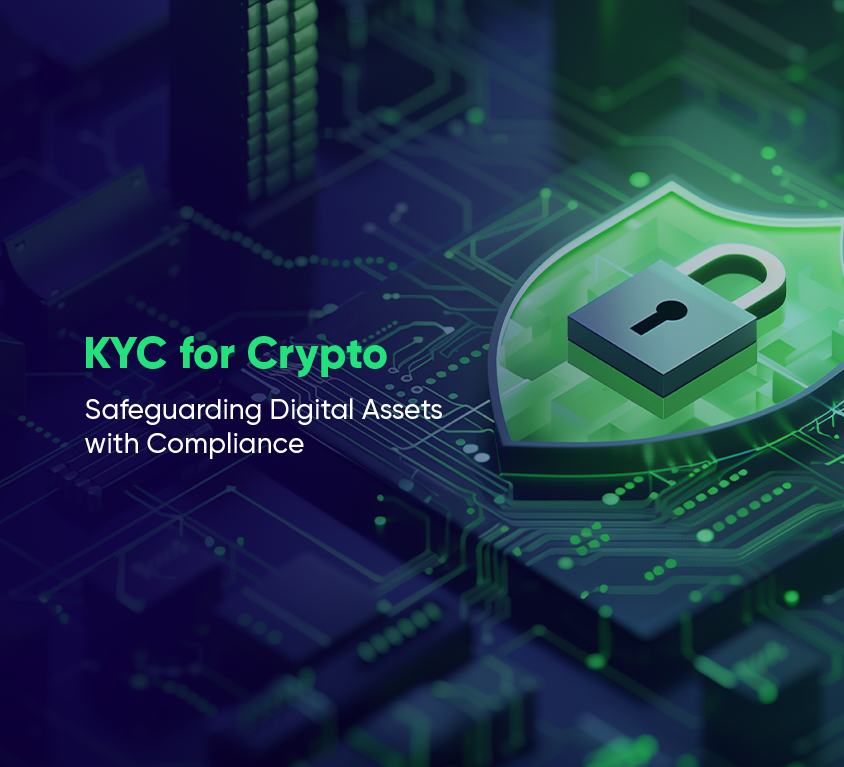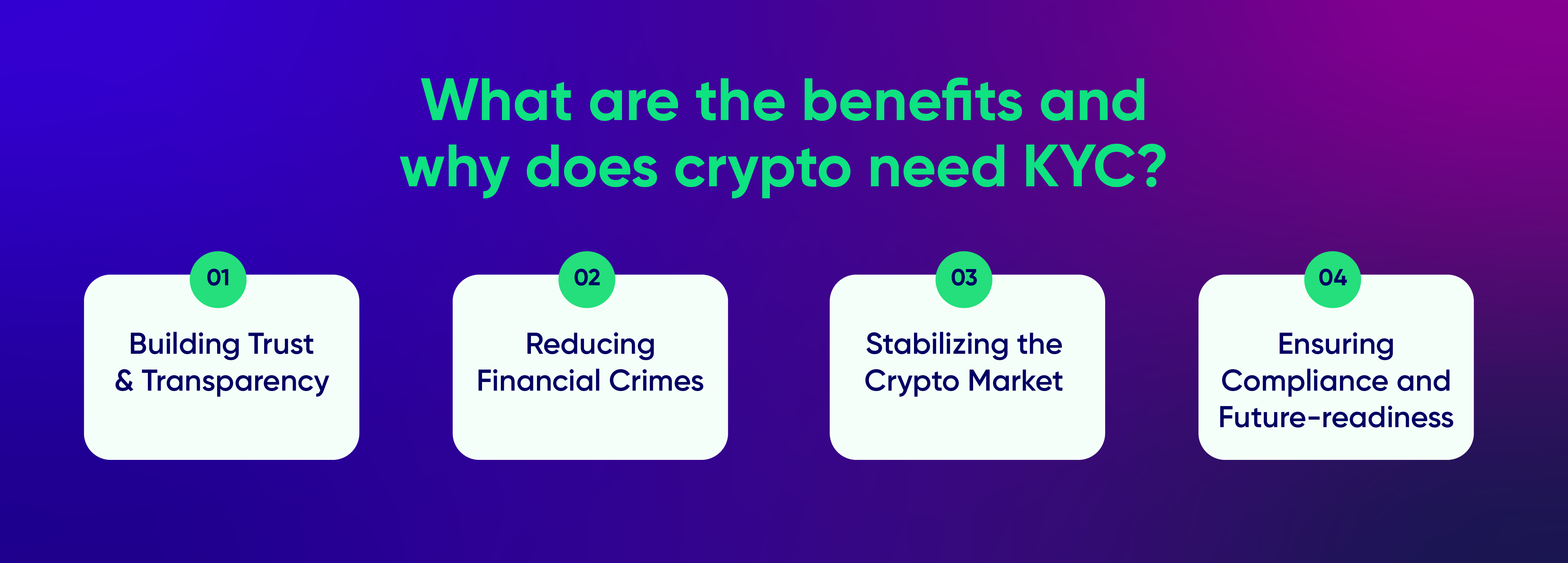
Introduction
Web3 & Blockchain Consultancy :
KYC for Crypto: Safeguarding Digital Assets with Compliance
Cryptocurrencies are transforming the finance sector. These digital currencies are encrypted on their blockchains, making transactions between users mostly anonymous and immediate. This speed and anonymity can be exploited by criminals seeking to bypass traditional anti-money laundering (AML) and counter-financing of terrorism (CFT) measures. As a result, global regulators are increasing their scrutiny of cryptocurrencies. For instance, in 2019, agencies like the SEC, FinCEN, and CFTC designated cryptocurrency exchanges as money service businesses (MSBs). This classification subjects these platforms to the Know Your Customer (KYC) and anti-money laundering (AML) regulations stipulated by the Bank Secrecy Act of 1970. Consequently, cryptocurrency exchanges now require new users to complete a KYC process before they can open an account. This process includes verifying the identity of the user and confirming their claimed identity is accurate.Key Takeaway
- KYC is essential for preventing illegal activities and ensuring compliance in the crypto industry.
- Most centralized exchanges require KYC, while decentralized platforms offer more anonymity but come with risks.
- KYC builds customer trust and transparency, reducing the chances of financial crimes.
- Effective KYC implementation can contribute to market stability and future regulatory compliance.
- BloxBytes provides blockchain development services that integrate with KYC, enhancing security and compliance for crypto platforms.
What is KYC in Crypto?
KYC (Know Your Customer) processes in the cryptocurrency world are designed to verify customer identities to thwart illegal activities such as money laundering, funding terrorism, and avoiding taxes. While some platforms may allow users to set up an account initially without completing the KYC verification, such accounts generally face significant restrictions. For instance, many exchanges prevent customers from buying cryptocurrencies or withdrawing funds until they have verified their identities. Some may also impose limits on how much money can be deposited. Each cryptocurrency exchange may approach KYC a bit differently, but typically, during the KYC process, you’ll be asked to provide:- Your full name
- Your date of birth
- Your home address
Can You Buy Crypto Without Kyc?
KYC (Know Your Customer) rules are common on nearly all centralized cryptocurrency exchanges. However, it’s still possible to purchase cryptocurrencies without completing KYC verification, though these methods are generally more complex and carry higher risks. Individuals who want to remain anonymous can opt to buy cryptocurrencies through decentralized exchanges and Bitcoin ATMs. While decentralized exchanges implement certain security features to deter fraud, the risk of being scammed remains. Additionally, these exchanges often charge higher transaction fees and are not as easy to use as their centralized counterparts. Therefore, while there are alternatives for those looking to remain anonymous, it’s usually safer and more practical for genuine buyers to undergo the KYC process on a regulated exchange. This process is often quick to complete.Does Kyc Affect Anonymity and Decentralization?
The concept of a decentralized economy often clashes with KYC (Know Your Customer) norms. Decentralized services are structured to preserve user anonymity and protect personal information from any central authority, making it difficult for crypto companies to identify their users. Nevertheless, regulatory bodies have been pushing for less anonymity in these systems. As a result, even crypto exchanges that initially resisted are now increasingly adopting stricter KYC measures under regulatory pressure. It’s worth noting that decentralized exchanges (DEXs), which facilitate trades through smart contracts rather than a centralized platform, currently do not have to comply with KYC standards. These platforms are not viewed as financial intermediaries or counterparties since they enable users to transact directly with each other using the DEX’s infrastructure. Despite this, the legal landscape for KYC in the cryptocurrency world is constantly evolving, and it’s possible that DEXs could fall under KYC regulations in the future as global regulators adjust the rules governing these processes.What Are the Benefits and Why Does Crypto Need Kyc?
The KYC (Know Your Customer) process is crucial for adhering to AML/CFT (Anti-Money Laundering and Counter Financing of Terrorism) rules that mandate financial institutions to know who their customers are and understand their financial dealings. KYC is vital because it helps prevent criminals from using complex tactics to dodge AML/CFT measures. By developing a detailed risk profile for each customer, crypto exchanges can identify and stop those who might use their services for illegal activities such as money laundering and terrorism financing.
- Building Trust and Transparency: Verifying a user’s identity enhances transparency and fosters trust among clients. Customers are more likely to continue using a platform if they believe it is actively safeguarding their accounts.
- Reducing Financial Crimes: The rise of cryptocurrency fraud is alarming, with a significant increase in reported cases over the years. For instance, a surge in crypto fraud cases was noted in the US in 2020, which underscored the need for stringent identity checks and KYC protocols. Effective KYC helps in decreasing the occurrence of these crimes and enhances the reputation of the market.
- Stabilizing the Crypto Market: The inherent volatility of the crypto market can be exacerbated by anonymous, and potentially illegal, transactions. Implementing KYC and verifying customer identities can help stabilize the market and make it more appealing to new investors.
- Ensuring Compliance and Future-readiness: The landscape of legal requirements for KYC is ever-changing. Exchanges that proactively implement strong KYC measures are better positioned for the future. These exchanges can focus more on enhancing customer experience and efficiency rather than catching up with new regulations.
Conclusion
The need for robust KYC processes becomes increasingly apparent in the domain of cryptocurrency which is continuously evolving. Ensuring compliance and safeguarding against financial crimes are not just regulatory requirements but essential practices that enhance trust and stability in the crypto market. This is where BloxBytes steps in. As a leading blockchain development company, BloxBytes offers cutting-edge solutions tailored for the crypto industry. Our blockchain services are designed to integrate seamlessly with KYC processes, enhancing security and ensuring that your platform adheres to the latest regulatory standards. With BloxBytes, empower your cryptocurrency operations to be more secure, compliant, and user-friendly, paving the way for a more reliable and flourishing digital asset ecosystem.Frequently Ask Questions
-
Why is KYC important for cryptocurrency exchanges?
KYC is crucial for cryptocurrency exchanges because it helps prevent illegal activities such as money laundering and terrorism financing. By verifying users’ identities, exchanges can create a safer environment and build trust with customers, while also ensuring compliance with regulatory standards. -
Can I buy cryptocurrency without going through the KYC process?
Yes, it is possible to buy cryptocurrency without KYC on certain platforms, such as decentralized exchanges and Bitcoin ATMs. However, these methods often come with increased risks and higher fees. Centralized exchanges typically require KYC to provide a more secure and regulated experience. -
How does KYC affect the anonymity of crypto transactions?
KYC reduces the level of anonymity in crypto transactions by requiring users to provide personal identification information. While this affects privacy, it helps exchanges comply with regulations and reduces the likelihood of financial crimes, contributing to a more stable and trusted market. -
How can blockchain development services like those offered by BloxBytes assist with KYC compliance?
BloxBytes provides specialized blockchain development solutions that can be seamlessly integrated with KYC and AML processes. Their services help ensure that crypto platforms remain compliant with regulatory requirements while maintaining security and an optimal user experience, fostering growth in the digital asset space.